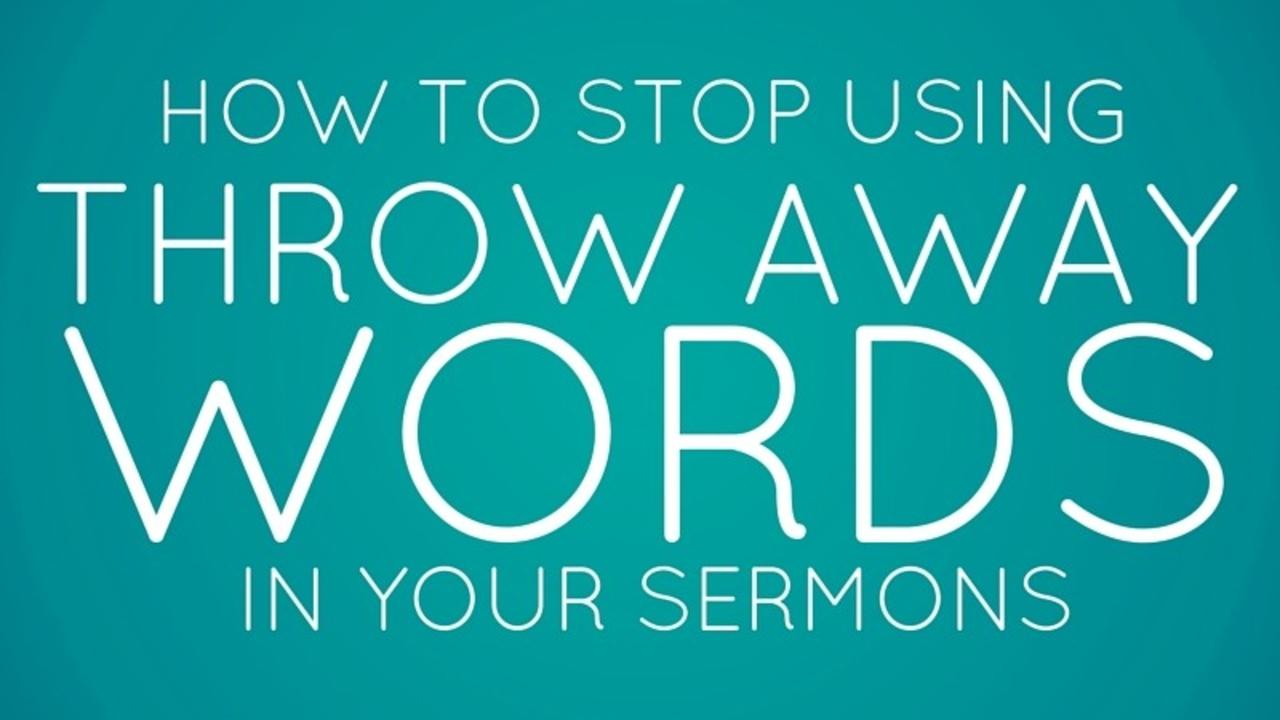How to Stop Using Throw Away Words in Sermons

Pauses are great. They can add emphasis and give more weight to your point. A well-placed pause is a powerful public speaking tool that you should know how to use.
But the wonderful effect of a pause is destroyed by a terrible public speaking mistake preachers make: the audible pause. What’s an audible pause?
Well, um, it’s uh, um, I think it’s uh… (Sorry, just had to do that).
An audible pause is when you fill in the gaps of your speech with throw away words like “um” “uh” “you know” “like” and others.
These throw away words are a huge distraction, and every public speaker must deal with them if they are going to stand out. To audibly pause is natural. To quit audibly pausing is a lot of work, but it’s what separates the preachers from the donkeys. Here’s how to stop using throw away words in sermons:
1. Rehearse your sermons out loud.
This is a vital step to successful delivery. It amazes me how many preachers don’t rehearse their sermons out loud before they deliver. Rehearsing allows you to know exactly what to expect when you get up to preach. You don’t want surprises; you want to have a grasp on every detail of your sermon. Rehearsing enables this and keeps you from guessing in the moment and filling in the gaps with audible pauses. The fewer surprises, the less chance you’ll nervously use audible pauses.
2. Prepare well.
This is related to number one, but in addition to rehearsing you need to be completely prepared for your sermon. This includes adequate study and preparation, a clear state of mind and enough intellectual and emotional energy to push through.
3. Slow down.
If you’re in a hurry, you probably have too much content. You should be able to articulate your points without rushing around and audibly pausing all over everyone.
4. Consider using a manuscript for a time.
I don’t use a manuscript, but one benefit of them is that you have a precise and thorough guide for your sermon. If you have a hard time shaking the habit of audibly pausing, then consider giving manuscripts a try. If you do use one make sure you look up. As much as you want to avoid throw away words, you certainly don’t want your listeners to watch you read a script. For an example of how to preach from a manuscript effectively check out sermons by Sam Storms.
5. Queue yourself up for your next thought.
One of the most common reasons why you use words like “uh” and “um” is because you are trying to think of what’s next. Your next story, your next thought, your next word. Prepare your sermon in such a way that you have built in transitions that queue your mind for what’s next. When I preach, my transitional cues are internalized so I know exactly where I’m headed with the sermon at any given time. I have also organized my notes so that I can look down at any point and have an immediate visual cue to let me know where I need to go next. I don’t usually need to look at my notes because of my preparation methods, but it is helpful to have it as a backup.
6. Watch your game film.
Watch yourself preach on video and keep track of when you use audible pauses. Look for patterns and work on eliminating them. It may feel awkward or embarrassing, but if you’re serious about getting better give it a try.
8. Enlist the help of a friend.
Have a trusted friend make a list of every time you use filler words in a sermon. They might have a perspective as to why you do it. They also may help you identify patterns that you are unable to see yourself. My wife has been incredibly helpful in this area for me.
9. Get a foam hand and have someone smack you in the face every time you do it.
Self-imposed physical pain is always a great way to train yourself to kick a habit.
Want more help improving your preaching? Check out my new book: Preaching Killer Sermons: How to Create and Deliver Messages that Captivate and Inspire.
Do you use throw away words when you preach? What have you found helpful to stop?


